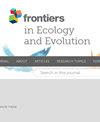Evolution of regulatory mechanisms underlying nutrition-responsive plasticity in insects
IF 2.4
3区 环境科学与生态学
Q2 ECOLOGY
引用次数: 0
Abstract
Phenotypic plasticity is a fundamental property of developing organisms and is thought to play an important role in diversification. Plastic responses themselves are remarkably diverse and respond to a wide range of environmental factors. Here I focus on plasticity in response to variation in nutrition in insects since 1) nutrition is a widespread factor that impacts most organisms, and 2) insects are important models to study phenotypic plasticity. First, I provide a brief overview of our current mechanistic understanding of the regulation of nutritionally cued plasticity in insects, in both traditional as well as emerging model systems. Then, I explore evolutionary mechanisms enabling the diversification of regulation across taxa, emphasizing the role of gene duplication and gene regulatory network co-option. Furthermore, I examine nutrition-responsive phenotypes as suites of multiple traits that develop in a coordinated manner. I argue that understanding how these traits are integrated at the molecular level can shed light on the evolution of complex phenotypes. Finally, I discuss potential challenges and opportunities to further our understanding of nutrition-responsive plasticity, its regulation, and its evolution.昆虫营养响应可塑性背后的调控机制的进化
表型可塑性是发育中生物的基本特性,被认为在生物多样化过程中发挥着重要作用。可塑性反应本身具有显著的多样性,可对多种环境因素做出反应。在这里,我将重点研究昆虫对营养变化的可塑性反应,因为:1)营养是影响大多数生物的广泛因素;2)昆虫是研究表型可塑性的重要模型。首先,我简要概述了我们目前对昆虫营养诱导可塑性调控的机制理解,包括传统的和新兴的模式系统。然后,我探讨了使不同类群的调控多样化的进化机制,强调了基因复制和基因调控网络共通的作用。此外,我将营养响应表型视为以协调方式发展的多种性状的组合。我认为,了解这些性状在分子水平上是如何整合的,可以揭示复杂表型的进化过程。最后,我讨论了进一步了解营养响应可塑性、其调控及其进化的潜在挑战和机遇。
本文章由计算机程序翻译,如有差异,请以英文原文为准。
求助全文
约1分钟内获得全文
求助全文
来源期刊

Frontiers in Ecology and Evolution
Environmental Science-Ecology
CiteScore
4.00
自引率
6.70%
发文量
1143
审稿时长
12 weeks
期刊介绍:
Frontiers in Ecology and Evolution publishes rigorously peer-reviewed research across fundamental and applied sciences, to provide ecological and evolutionary insights into our natural and anthropogenic world, and how it should best be managed. Field Chief Editor Mark A. Elgar at the University of Melbourne is supported by an outstanding Editorial Board of international researchers. This multidisciplinary open-access journal is at the forefront of disseminating and communicating scientific knowledge and impactful discoveries to researchers, academics and the public worldwide.
Eminent biologist and theist Theodosius Dobzhansky’s astute observation that “Nothing in biology makes sense except in the light of evolution” has arguably even broader relevance now than when it was first penned in The American Biology Teacher in 1973. One could similarly argue that not much in evolution makes sense without recourse to ecological concepts: understanding diversity — from microbial adaptations to species assemblages — requires insights from both ecological and evolutionary disciplines. Nowadays, technological developments from other fields allow us to address unprecedented ecological and evolutionary questions of astonishing detail, impressive breadth and compelling inference.
The specialty sections of Frontiers in Ecology and Evolution will publish, under a single platform, contemporary, rigorous research, reviews, opinions, and commentaries that cover the spectrum of ecological and evolutionary inquiry, both fundamental and applied. Articles are peer-reviewed according to the Frontiers review guidelines, which evaluate manuscripts on objective editorial criteria. Through this unique, Frontiers platform for open-access publishing and research networking, Frontiers in Ecology and Evolution aims to provide colleagues and the broader community with ecological and evolutionary insights into our natural and anthropogenic world, and how it might best be managed.
 求助内容:
求助内容: 应助结果提醒方式:
应助结果提醒方式:


